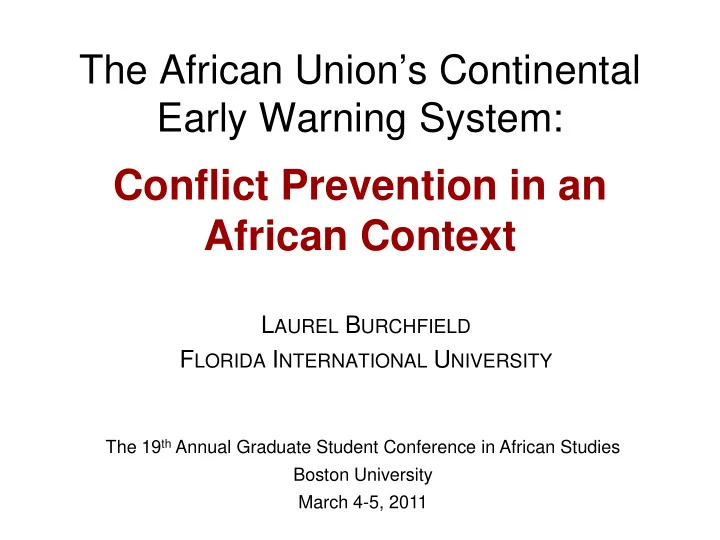

The African Union’s Continental Early Warning System: Conflict Prevention in an African Context L AUREL B URCHFIELD F LORIDA I NTERNATIONAL U NIVERSITY The 19 th Annual Graduate Student Conference in African Studies Boston University March 4-5, 2011
Continental Early Warning System (CEWS) • Protocol Relating to the Establishment of the Peace and Security Council of the African Union – “In order to facilitate the anticipation and prevention of conflicts” • 2 stages: – Data collection and analysis (early warning) – Conflict prevention strategies (early action)
Early Warning Systems
Stage 2: Conflict Prevention • 2 forms of conflict prevention – Structural intervention (deep intervention) • Democratic Institutions • Development Initiatives – Direct intervention (light intervention) • Preventive Diplomacy • Military and Economic Interventions • Warning-Response Gap – Political Will and Capacity • Regionalization
CEWARN “Empowering stakeholders to prevent violent conflicts” • Intergovernmental Authority on Development (IGAD) • Focused on cross-border pastoralist and related conflicts • Capacity for Structural Intervention – Rapid Response Fund-financially supports local peace committees • Capacity for Direct Intervention – Mapping projects of clusters – CEWERU (Conflict Early Warning and Response Units) • Limitations and Strengths
Warning-Response Gap & Traditional Methods Are traditional and local methods a resource for the gap between early warning and early action? • What is Traditional? – Focus on reconciliation, relationship-building – Use of mediators (elders, women, religious leaders)
Future Research • What traditional methods are being used? • How does CEWARN support traditional methods of conflict prevention? • Are they efficient and institutionalized? • How can the AU incorporate this into CEWS?
Recommend
More recommend